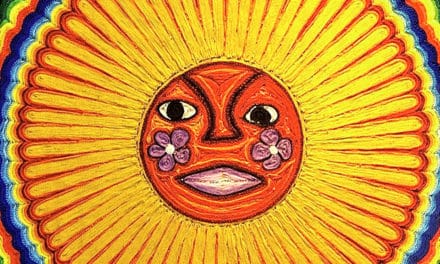
I first met Sammy* when she posted an ad in our freshman college dorm building: ‘Musicians wanted: Forming a funk-pop band!’ it declared. We had our first and only impromptu jam session that fall, then I didn’t see her again until the summer. That June, she wandered into a dreary acoustic show my band played at The Bitter End in downtown Manhattan. Afterwards, we all journeyed back to another room I had just moved into that week, to celebrate with cheap beer and moderate-quality weed.
She firmly refused my then girlfriend’s offer to chip in some cash for her weed: “Nonsense, it’s meant to be shared!” she laughed. From that night on, Sammy became one of my best friends in New York. And slowly over the years, I came to understand how she lived and thrived as an adult with autism spectrum disorder (ASD).
“It’s hard to describe living with ASD because I’ve never lived without it,” said Sammy to Psychedelic Times. “There’s a lack of cognizance, and a sense of ‘living in my head.’ My earliest memories were very dream-like and divorced from reality. The older I’ve gotten, the more grounded I have become.”
Modern psychedelic research has focused on psychological disorders like post-traumatic stress disorder (PTSD) and various forms of depression. But we are slowly learning more about how different psychedelics may affect or help people living with ASD, including psilocybin, MDMA, and cannabis.
Sammy, originally from Los Angeles, CA, was diagnosed with ASD at age three but didn’t learn of it until she was ten. Since moving to New York City for college at age eighteen, she began a long, bizarre, and drug-fueled journey that helped her better understand her mental health and make lifelong friends. But Sammy cautions that like anyone else, people with ASD have to be especially careful with drugs like cannabis or LSD, and understand their complex effects.
Throughout her life, Sammy has also struggled with obsessive compulsive disorder, dissociative tendencies, bipolar disorder, and complex post-traumatic stress disorder (PTSD). She describes her ASD as the ‘base layer’ for these other mental health challenges.
Being a woman, taking acting classes at a young age, and performing well in school all gave Sammy an advantage in managing her ASD, she said. But to this day, she still feels there’s something “off” about her. She has also always been highly attuned to sensory input, something which psychedelics intensify.
Psychedelics only became a major part of her life after Sammy moved to New York to study film. “New York itself is like one giant psychedelic trip,” she said. She found in New York a saturated and sophisticated drug-using culture, with even more weed smokers than in her native Los Angeles.
Through her involvement in various communities and spaces—from her college chapter of Students For Sensible Drug Policy (SSDP) to sweaty BDSM parties to hippy warehouse raves—Sammy was exposed over the years to cannabis, MDA, LSD, DMT, psilocybin mushrooms, salvia, and MDMA.
She quickly picked up a regular smoking routine, but admits that cannabis still has complex effects for her. “It does make me calmer, but also more detached,” she said. “I’m not in a firestorm, emotionally, but I sometimes feel foggy when I use it.” The effects simply hinge on how much she consumes at a time. She noted that cannabis also helps her be more creative and empathetic, and makes her depression weigh less.
Some people with ASD naturally hallucinate, Sammy explained, and can suffer sleep paralysis. LSD, she found, helped her distinguish between different types of hallucinations and helped make them less uncomfortable, which also helped to calm her nightmares.
“LSD boosts the natural tendency my brain has to create patterns and dreams,” she said. “My acid trip was the first time I could actually control these visuals. It made me feel very child-like.” Of course, as for anyone using psychedelics, she noticed that slight changes in emotion could drastically alter her trip, for better or worse.
Another benefit Sammy found from psychedelics was in managing her dissociative tendencies. Dissociation is common for people with ASD and people that have suffered trauma, Sammy explained. She describes it as a feeling of confusion and emotional duress with no obvious cause.
“Acid makes me feel more grounded because I don’t dissociate,” she said. “I feel hyper-aware. Having ASD, you have a tendency to think in more abstract ways. So my acid trip feels more like home to me.” For comparison, the effect is less predictable with cannabis, which may either be helpful or have no effect on her dissociation.
Sammy has experimented with other substances like MDMA and psilocybin, though with less success. “MDMA made me feel talkative, social, and more confident,” she recounted. “But it didn’t lead to cognizant social revelations like with LSD. I think a lot of what I consumed was also laced, and generally not that great for my health.”
She continued, “One of the first times I tripped on mushrooms, I had a very negative experience, and it has colored my feelings about it ever since. After the one particularly bad trip, I always feel like I have a nasty cold when I use them. Last time I did them I watched Logan’s Run with a friend, and while the movie was great and my mood was fine, I physically felt sick.”
Sammy decided that the taste of mushrooms is too earthy for her to enjoy. Unlike with LSD, her experiences with MDMA and psilocybin did not really help her grow and understand her autism.
Sammy’s use of psychedelics has varied over the years and since she graduated from college. She’s not a perfect case study for understanding the cognitive effects of psychedelics on people with autism. But perhaps the most beneficial and instructive aspect of Sammy’s drug use was that it helped her make friends and share experiences with people from all around the country and the world.
Sammy moved back to Los Angeles in 2018, and has taken up the most psychedelic activity of all: story-telling. When she’s not working on social media for a popular television brand, she is singing, performing stand-up comedy, and writing and producing short films.
“I’ve always had stories inside of me, but it’s hard to communicate when you’re autistic,” she said. “Now I’m learning how to collaborate with other people and see my ideas change shape. I’m not focusing on all the ways I could fail—I’m just doing.”
*Sammy requested that Psychedelic Times respect her anonymity, as she believes she would face both professional and social consequences for being so open about using these substances.
Photo by Nathan Dumlao on Unsplash.









